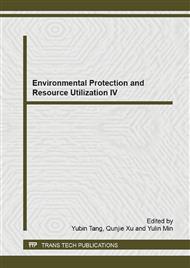[1]
Despeisse, M., Ball, P. D., Evans, S. & Levers, A. 2012. Industrial ecology at factory level: a prototype methodology. Proceedings of the Institution of Mechanical Engineers, Part B: Journal of Engineering Manufacture, 226(10), 1648-1664.
DOI: 10.1177/0954405412449937
Google Scholar
[2]
Oliver, H. & Abhishek, T. 2013. Environmental appraisal of green production systems: Challenges faced by small companies using life cycle assessment. International Journal of Product Research, 51(19), 5884-5896.
DOI: 10.1080/00207543.2013.807372
Google Scholar
[3]
Lam, T. I., Chan, H. W., Chau, C. K. & Poon, C. S. 2011. Environmental management system vs. Green specifications: How do they complement each other in the construction industry? Journal of Environmental Management, 92, 788-795.
DOI: 10.1016/j.jenvman.2010.10.030
Google Scholar
[4]
Tsireme, A. I., Nikolaou, E. I., Georgantzis, N. & Tsagarakis, K. P. 2012. The influence of environmental policy on the decisions of managers to adopt G-SCM practices. Clean Technologies and Environmental Policy, 14(5), 953-964.
DOI: 10.1007/s10098-012-0461-x
Google Scholar
[5]
Tsai, S. B. & Xue, Y. Z. 2013. Corporate Social Responsibility research among Manufacturing Enterprises: Taiwanese Electronic Material Manufacturing Enterprises. 2013 International Conference on Industrial Design and Mechanical Power (ICIDMP 2013).
DOI: 10.4028/www.scientific.net/amm.437.1012
Google Scholar
[6]
Izunildo, C., Antonio, G. & Virgilio, C. M. 2012. A decision-making model for Lean, Agile, Resilient and Green supply chain management. International Journal of Product Research, 50(17), 4830-4845.
DOI: 10.1080/00207543.2012.657970
Google Scholar
[7]
Payman, Ahi. & Cory, Searcy. 2013. A comparative literature analysis of definitions for green and sustainable supply chain management. Journal of Cleaner Production, 52(8), 329-341.
DOI: 10.1016/j.jclepro.2013.02.018
Google Scholar
[8]
Lee, Y. C., Chen, C. Y., Tsai, S. B. & Wang, C. T. 2014. Discussing Green Environmental Performance and Competitive Strategies. Pensee, 76(7), 190-198.
Google Scholar
[9]
Martilla, J. A. & James, J. C. 1977. Importance-Performance Analysis. Journal of Marketing, 41 (1), 77-79.
Google Scholar
[10]
Lee, Y. C., & Hsieh, Y. F. 2011. Modifying IPA with DEMATEL composite importance. Paper presented at the meeting of 2011 International Conference on Fuzzy Systems and Neural Computing, Hong Kong, China.
Google Scholar
[11]
Chen, C. F. & Chen, F. S. 2010. Experience quality, perceived value, satisfaction and behavioral intentions for heritage tourists. Tourism Management, 31(1), 29-35.
DOI: 10.1016/j.tourman.2009.02.008
Google Scholar
[12]
Tsai, S. B., Lee, Y. C., Wu, C. H. & Guo, J. J. 2013. Examining How Manufacturing Corporations Win Orders. South African Journal of Industrial Engineering, 24(3), 112-124.
DOI: 10.7166/24-3-657
Google Scholar


